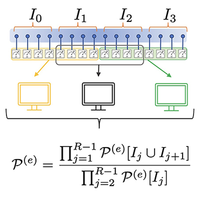Many-Body Entropies and Entanglement from Polynomially Many Local Measurements
IF 11.6
1区 物理与天体物理
Q1 PHYSICS, MULTIDISCIPLINARY
引用次数: 0
Abstract
Estimating global properties of many-body quantum systems such as entropy or bipartite entanglement is a notoriously difficult task, typically requiring a number of measurements or classical postprocessing resources growing exponentially in the system size. In this work, we address the problem of estimating global entropies and mixed-state entanglement via partial-transposed (PT) moments and show that efficient estimation strategies exist under the assumption that all the spatial correlation lengths are finite. Focusing on one-dimensional systems, we identify a set of approximate factorization conditions (AFCs) on the system density matrix, which allow us to reconstruct entropies and PT moments from information on local subsystems. This identification yields a simple and efficient strategy for entropy and entanglement estimation. Our method could be implemented in different ways, depending on how information on local subsystems is extracted. Focusing on randomized measurements providing a practical and common measurement scheme, we prove that our protocol requires only polynomially many measurements and postprocessing operations, assuming that the state to be measured satisfies the AFCs. We prove that the AFCs hold for finite-depth quantum-circuit states and translation-invariant matrix-product density operators and provide numerical evidence that they are satisfied in more general, physically interesting cases, including thermal states of local Hamiltonians. We argue that our method could be practically useful to detect bipartite mixed-state entanglement for large numbers of qubits available in today’s quantum platforms.

多项式多局部测量的多体熵和纠缠
估算多体量子系统的全局属性(如熵或双态纠缠)是一项众所周知的艰巨任务,通常需要大量测量或经典后处理资源,这些资源随系统规模呈指数增长。在这项工作中,我们解决了通过部分反演(PT)矩估计全局熵和混合态纠缠的问题,并证明在所有空间相关长度都是有限的假设条件下,存在高效的估计策略。我们以一维系统为重点,确定了系统密度矩阵上的一组近似因式分解条件(AFC),从而可以根据局部子系统的信息重建熵和 PT 矩。这种识别方法产生了一种简单高效的熵和纠缠估计策略。我们的方法可以以不同的方式实施,这取决于如何提取局部子系统的信息。我们将重点放在提供实用和常见测量方案的随机测量上,证明我们的协议只需要多项式数量的测量和后处理操作,前提是要测量的状态满足 AFCs。我们证明了 AFCs 在有限深度量子电路状态和平移不变矩阵-乘积密度算子中成立,并提供了数值证据,证明它们在更普遍、物理上更有趣的情况下也能满足要求,包括局部哈密顿的热状态。我们认为,我们的方法对于检测当今量子平台上大量量子比特的双向混合状态纠缠是非常有用的。
本文章由计算机程序翻译,如有差异,请以英文原文为准。
求助全文
约1分钟内获得全文
求助全文
来源期刊

Physical Review X
PHYSICS, MULTIDISCIPLINARY-
CiteScore
24.60
自引率
1.60%
发文量
197
审稿时长
3 months
期刊介绍:
Physical Review X (PRX) stands as an exclusively online, fully open-access journal, emphasizing innovation, quality, and enduring impact in the scientific content it disseminates. Devoted to showcasing a curated selection of papers from pure, applied, and interdisciplinary physics, PRX aims to feature work with the potential to shape current and future research while leaving a lasting and profound impact in their respective fields. Encompassing the entire spectrum of physics subject areas, PRX places a special focus on groundbreaking interdisciplinary research with broad-reaching influence.
 求助内容:
求助内容: 应助结果提醒方式:
应助结果提醒方式:


